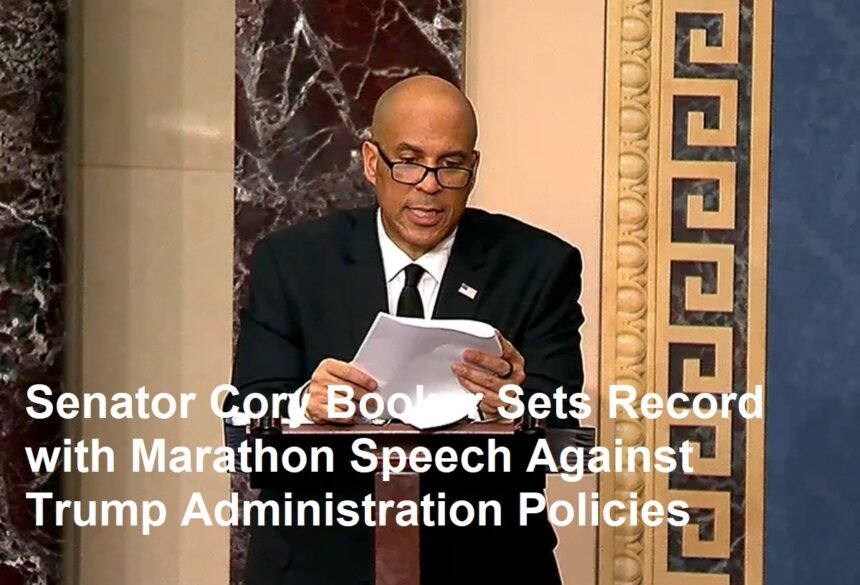In a historic display of determination and resolve, Senator Democrat Cory Booker made headlines by delivering the longest speech in U.S. Senate history. Spanning an incredible 25 hours and 5 minutes, Booker’s marathon address began on the evening of Monday, March 31, 2025, and concluded in the early hours of Tuesday, April 1, 2025. The record-breaking speech, which was aimed at protesting the policies of the Donald Trump administration, has sparked nationwide discussions about free speech, political dissent, and the state of American governance.
Senator Booker, known for his passionate and articulate oratory, took to the Senate floor to voice his strong opposition to several key policies enacted by the current administration. With unwavering determination, he critiqued what he described as “unjust and regressive measures” that he argued were detrimental to the country’s social fabric and economic stability. Booker’s speech was a clarion call for accountability and a demand for a more compassionate and inclusive approach to governance.
The Senator’s lengthy address was not only a protest against specific policies but also a symbolic gesture aimed at highlighting the power of persistent advocacy in the face of political adversity. “This is not just about policy differences,” Booker stated during his speech. “It is about standing up for the values we hold dear and ensuring that our nation does not lose sight of justice, equality, and the rights of every individual.” His words resonated with supporters and critics alike, setting the stage for a broader debate on the role of long-winded rhetoric in political discourse.
Booker’s record-breaking performance eclipsed the long-held record of Senator Strom Thurmond, who famously delivered a 24-hour, 18-minute speech in 1957. Thurmond’s marathon address had been seen as a symbol of staunch opposition during a turbulent period in U.S. history. By surpassing this record, Booker not only etched his name into Senate history but also drew attention to the enduring nature of political protest as a means of effecting change. Many commentators have noted that such feats, though physically and mentally exhausting, underscore the commitment of elected officials to engage deeply with issues that affect millions of lives.
Throughout his 25-hour-plus speech, Booker covered a wide range of topics, from healthcare and immigration reform to economic inequality and civil rights. His comprehensive critique of the Trump administration’s policies was interspersed with calls for bipartisan cooperation and renewed efforts to bridge the widening gaps in American society. “We must remember that our differences should never divide us when it comes to fighting for the common good,” Booker insisted, urging his colleagues to work together despite political rivalries.
The reaction to Booker’s marathon speech was mixed. Supporters praised him for his perseverance and commitment to the issues at hand, viewing his effort as a powerful reminder of the importance of debate and dissent in a healthy democracy. “Cory Booker’s speech was a testament to the enduring spirit of public service,” commented one political analyst. “In a time when voices of opposition are often muted, his record-setting effort reminds us that every second spent in defense of democratic values is invaluable.”
Opponents, however, criticized the speech as an exercise in theatrics that, while impressive in duration, did little to advance concrete policy solutions. Some argued that the lengthy monologue served more as a symbolic protest than a practical forum for addressing the urgent issues facing the nation. Despite these critiques, the impact of Booker’s speech on the national conversation has been undeniable, igniting debates in newsrooms, on social media, and within the halls of Congress.
As the Senate moves forward, the record set by Senator Booker will likely be remembered as a defining moment of political dissent in the modern era. His 25-hour and 5-minute speech stands as a powerful reminder that in the pursuit of justice and equality, sometimes the longest voices can echo the loudest.












